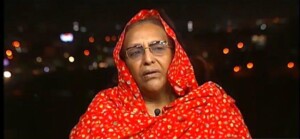More than 40,000 public order cases annually in Sudan capital: SDFG
According to the Sudan Democracy First Group (SDFG), the Sudanese Public Order Law is meant to oppress and dominate the population.
In a new report released on 3 January, the Kampala-based Sudanese think-tank states that the content the Public Order Law violates the 2005 Constitution in which basic personal freedoms are embedded.
Moreover, the excessive application of the Law and the methods of its application in most cases result in judicial violations, especially against women, ethnic groups, and religious sects that do not subscribe to government’s version of Islam.
According to the Sudan Democracy First Group (SDFG), the Sudanese Public Order Law is meant to oppress and dominate the population.
In a new report released on 3 January, the Kampala-based Sudanese think-tank states that the contents of the Public Order Law violate the 2005 Constitution in which basic personal freedoms are embedded. Moreover, the excessive application of the Law and the methods of its application in most cases result in judicial violations, especially against women, ethnic groups, and religious sects that do not subscribe to government’s version of Islam.
Courts and police statistics show that more than 40,000 public order cases are annually recorded in Khartoum state alone. Only a few of them receive wide media coverage, as was the case with well-known activist Winnie Omar in December last year. However, SDFG states, a large number of the cases in the Public Order Courts do not receive sufficient media coverage because the victims are from the poorest classes, or they do not have a high profile within the civil and political community.
The No to Oppression of Women Initiative reported in April last year that more than 45,000 complaints were issued against women under the Public Order Law in 2016. At least 15,000 women were sentenced to flogging.
Behaviour
The Public Order Law was initiated by the Sudanese government in Khartoum state in 1992, and amended in 1996 before it was applied to all states. In 2009, the name of the law was changed to the Community Safety Act, and the Public Order Police was changed to the Community Security Police.
The Law includes articles from chapter 15 of the Sudan Criminal Code, that criminalise certain personal behaviours such as indecent clothing, drinking of alcohol, offensive acts and seduction, among others.
Moreover, the Law covers a wide jurisdiction that includes the gathering of women and men in certain places, the use of public transportation, conditions of ‘good conduct’ for women workers, the use of loudspeakers, music concerts, and the opening hours of restaurants and shops.
‘Repressive tool’
The articles and provisions of the Law are specifically formulated in vague language, to give the police and the courts a free hand in its implementation, the SDFG says. The Law also gave the Public Order Police the powers of intrusion in private domains to enforce its articles.
Article 152 of the Criminal Code, on indecent clothing, is a good example of the vague definitions in the Law. The article does not set a concise definition of what constitutes ‘indecent clothing’. Thus, the application of this Article depends on the personal judgement of the arresting police officer.
In addition to this, it has led to misuse of the law by Public Order Police officers. There are numerous cases where detained women were financially, physically, and even sexually abused by policemen in exchange for their release.
These practices turn the Law into a repressive tool to enforce a particular behaviour and image of the society, the SDFG report reads.
Discriminatory
The Public Order Law promotes discrimination against women with most of its articles focusing on their activities. The application of these articles systematically targets the presence of women in the public sphere in an attempt to limit their mobility and social activities.
The provisions of the Law are as well discriminatory against non-Muslims, especially Christians. There are many incidents of Christian women being detained by the Public Order Police on charges of indecent clothing.
Punishments
Detainees of the Public Order Law are usually presented to specialised courts held on the day following the arrests.
The defendants are not allowed to defend themselves or consult lawyers. In almost all these trials, the police officer is the complainant and the witness at the same time, and the sentence is issued and executed immediately.
All articles of the Law include the penalty of a fine, which turns the Public Order Courts into a source of revenue for the state. A recent report estimated that the average monthly revenue from the fines of the Public Order Courts are SDG 600,000 ($ 85,000*) in Khartoum state alone.
What makes the situation worse, the report reads, is that up to 10 per cent of the fines collected is allocated to the judge who issues the verdict.
The punishments provided in the Public Order Laws further include flogging that is carried out openly in order to humiliate the victims.
According to an estimate in 2011, almost 2,600,000 lashes flame the bodies of Sudanese citizens every year as a result of judicial decisions issued by the Public Order Courts.
The African Commission on Human and Peoples' Rights issued a resolution in 2000 demanding the Sudanese government to abolish the punishment of flogging and compensate those affected. However, Khartoum ignored the resolution and continued to enforce such punishments.
Despair
The Public Order Law remains one of the most central instruments of repression by the Sudanese regime, the Sudanese think-tank concludes. It is used by the government as a tool to show strength and bully the population in order to create a continuous state of fear, despair, and loss of hope for any prospect of change.
*Based on the official US Dollar rate quoted by the Central Bank of Sudan (CBoS)











 and then
and then